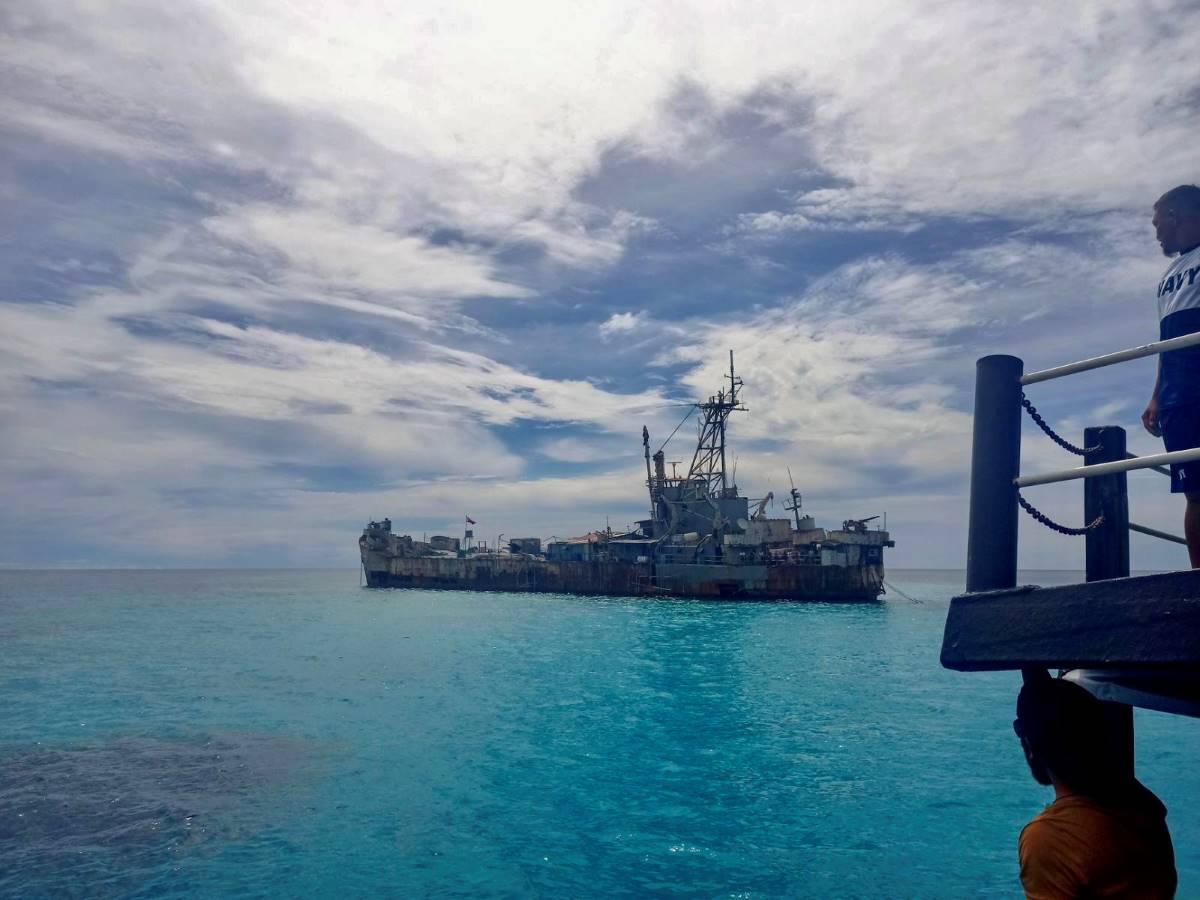China says PH promised to remove BRP Sierra Madre at Ayungin Shoal

China on Monday accused the Philippines of seeking to “permanently occupy” the Ayungin Shoal and again raised its demand for the removal of BRP Sierra Madre in what it called Ren’ai Jiao.
The Chinese Ministry of Foreign Affairs issued the statement as part of its comment on the US State Department's statement which criticized China over its ships blocking Philippine boats on a resupply mission for the Navy vessel.
“The historical context of the issue of Ren’ai Jiao is very clear. In 1999, the Philippines sent a military vessel and deliberately ran it aground at Ren’ai Jiao, attempting to change the status quo of Ren’ai Jiao illegally,” the statement read.
“China immediately made serious démarches to the Philippines, demanding the removal of the vessel. The Philippines promised several times to tow it away but has yet to act. Not only that, the Philippines sought to overhaul and reinforce the military vessel in order to permanently occupy Ren’ai Jiao,” it added.
The BRP Sierra Madre has been at the Ayungin Shoal since 1999. The ship manned by more than a dozen Marines and sailors has become a symbol of Philippine sovereignty in the offshore territory.
Ayungin is located 105.77 nautical miles from the nearest Philippine province of Palawan and constitutes part of the country’s 200-nautical mile continental shelf as provided under the United Nations Convention on the Law of the Sea (UNCLOS).
Over the weekend, the Philippine Coast Guard (PCG) said the China Coast Guard used "dangerous maneuvers and illegal use of water cannons" against vessels of the coast guard which were escorting indigenous boats to deliver food, water, fuel, and other supplies to military troops stationed on the BRP Sierra Madre.
Several countries — led by the United States, Australia, Japan, and Canada — expressed support for Manila and criticized China's actions, the latest in the string of several reported incidents of harassment against Philippine vessels this year.
Beijing claimed that the Philippine ships intruded into the Ayungin Shoal and violated their laws when it conducted the supply mission.
“On August 5, in disregard of China’s repeated dissuasion and warning, the Philippines sent two vessels that intruded into the adjacent waters of Ren’ai Jiao and tried to deliver the construction materials for overhauling and reinforcing the grounded military vessel,” the foreign ministry statement said.
“The CCG vessels stopped them in accordance with law and warned them off through appropriate law enforcement measures. Their maneuvers were professional, restrained, and beyond reproach,” it added.
China also reiterated its rejection of the Philippines’ 2016 victory in a landmark ruling by the Permanent Court of Arbitration that invalidated Beijing’s massive claims in South China Sea. It further alleged the US is sowing “confusion and discord” over its support to Manila.
“The South China Sea arbitration was a pure political drama staged in the name of the law with the US pulling strings behind the scenes. The so-called award contravenes international laws, including UNCLOS, and is illegal, null and void,” the statement read.
“We urge the US to stop utilizing the South China Sea issue to sow confusion and discord, and we urge it to respect China’s territorial sovereignty, maritime rights, and interests in the South China Sea, and respect regional countries’ efforts to uphold peace and stability in this region,” it added.
No ‘gray area’
Retired Senior Associate Justice Antonio Carpio said there was no “gray area” in the discussions over the Philippines and China’s claims in the West Philippine Sea as the Permanent Arbitration Court ruling in The Hague in 2016 upheld Manila’s claims in the resource-rich waters and rejected Beijing's expansive nine-dash claim.
“Walang gray area kasi may ruling na tayo at sinabi ng arbitral tribunal (There is no gray area because we have a ruling and the arbitral tribunal said), Ayungin Shoal is a low-tide elevation, low tide feature and forms part of the EEZ of the Philippines,” said Carpio.
“It forms part of the EEZ. Under UNCLOS [United Nations Convention for the Law of the Sea], only the coastal state, only the Philippines can put up a structure there. And no country can stop us from putting up a structure there. China has no right whatsoever to stop us because that’s our exclusive economic zone,” he added.
The Philippines should call on United Nations (UN) member-states to condemn China’s actions as these violate the UN Charter and UNCLOS, according to Carpio.
“That is considered, that’s a threat of force. Bawal (It is allowed). The UN Charter prohibits states from settling disputes by threat or use of force. All disputes must be settled by negotiation, mediation, arbitration, and judicial settlement. That’s the basic principle, foundation of the UN Charter,” he added.
GMA Integrated News sought comment from Malacañang but it has yet to respond.
In July 2016, the UN Permanent Court of Arbitration in The Hague, based on a case filed by the Philippines, junked China's nine-dash line claim covering the entire South China Sea, including the West Philippine Sea. China has refused to acknowledge the ruling. —NB/KG, GMA Integrated News



